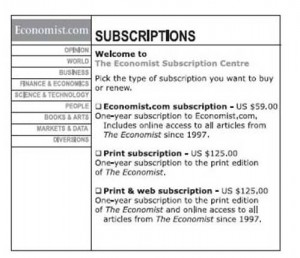What can I say about Dan Ariely! This book is simply awesome! It’s a goldmine of insights. A must-read for planners looking to understand human behavior. This whole idea of behavioral economics is very intriguing (I did a post earlier on the same subject). Through a series of experiments Dan repeatedly proves his point about the infallibility of our mind that drives us to make decisions and do things we rationally cannot imagine doing. The scope of his research covers various dimensions of life from society to economics, from the mundane to the extraordinary. The findings are shockingly counterintuitive. For example, how a decoy on the Economist Subscription page leads people to go for the expensive print plus web subscription because the decoy makes it seem that the web subscription has been thrown in for free. Whereas without the decoy experiments have proven that most people went for the cheaper web-only option. See image below (although this has been changed now!). How can we be manipulated so easily?
 Spot the decoy that makes you go for the more expensive option
Spot the decoy that makes you go for the more expensive option
I would like to talk about a whole bunch of such intriguing examples and insights, but I guess I would save those for later posts. But I would like to point to a section towards the end of the book which I think captures it’s essence. It is surprising to see how in a world where “change is the only constant” some old ways of looking at the world continue to dominate popular thinking. The analogy that Dan draws on is how man is clear when it comes to his physical limitations and is using all resources and technology to overcome these limitations but when it comes to the mind he believes he is limitless, flawless and continues to operate under the age-old framework of rational economics to explain how he would behave in real life. This he proves through the course of his book is far from true. He also states that continuing to operate under this framework is dangerous as some key issues facing mankind need to be addressed like how to avoid getting into another big economic crisis, how to create better educational systems, how to model health-care etc. It is time for us to look more openly and challenge these conventional ways of dealing with societal and economic issues.
Not surprisingly Dan also spoke about the core concepts of his book in a talk at TED. I have posted the video here. Check it out !
just got the book. would love to hear more of your thoughts on it in your future blogs…meanwhile reading the first page made me remember another great ted video by dan gilbert. he also talks about how we wrongly rationalize about what we feel is expensive and what isnt
http://www.ted.com/talks/dan_gilbert_researches_happiness.html